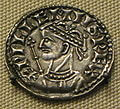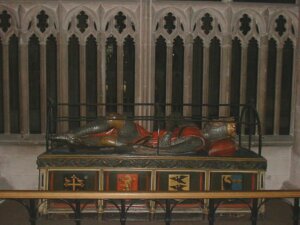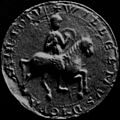These days, inheritance rights are defined in law. when someone dies, the first thing to do is to look for a will. If no will is found, or the will is invalid, there are rules of intestacy that determine who inherits what. But these rules were not thought of in medieval times.

William the Conqueror silver coin
I came across a fascinating article on Medievalists.net called The Almost Kings of Anglo-Norman England. It tells the stories of four men who had a strong claim to be king, but who were never crowned: Robert Curthose, William Clito, Theobald II and Eustace. It also explains the problems of trying to become king, and they were largely the same for the aristocracy too.
In contrast to modern conceptions of statehood, the vast majority of the rulers of medieval polities and kingdoms did so through personal rather than institutional authority. Indeed, the extent and definitions of such polities were often plastic, stretching only as far as their ruler’s ability to meaningfully exert authority and changing from generation to generation as a result of changing dynastic and political contexts.
Yes, often a region’s relationship to a particular kingdom was informed by historical and geographical factors but ultimately the form and terms of their inclusion were the result of a personal accommodation between the ruler and that region’s powerbrokers. Sometimes this bargain was as simple as “you’ll do what I say and pay me taxes otherwise I’ll attack you with my army,” but the majority of medieval kings ruled the aristocracy on the rough understanding that they were first amongst equals. Medieval kings and Princes had to walk a narrow tightrope of projecting unassailable power while maintaining a practical awareness that their positions rested upon effective cooperation with the aristocracy.

Robert Curthose, eldest son of William the Conqueror
Robert Curthose, eldest son of William the Conqueror, is a case in point. I’ll leave you to read the intricate details on the original article, but the start of the trouble was that William’s will did not treat Normandy and England together. According to custom, William left his original duchy, Normandy, to his heir and left England to his second son, William Rufus, like second prize!

William Rufus seal
Immediately the power struggles started between those who supported Rufus and those who wanted Robert, as the eldest son. Even when Rufus was killed in a hunting ‘accident’, the third son, Henry, grabbed the throne before Robert could come back from Normandy. Then it got really complicated!
Just to add to the complications, in Wales, inheritance was different again. I wrote about it here before.
 Ann Marie Thomas is the author of five medieval history books, a surprisingly cheerful poetry collection about her 2010 stroke, and the science fiction series Flight of the Kestrel, Intruders, Alien Secrets & Crisis of Conscience are out now Follow her at http://eepurl.com/bbOsyz
Ann Marie Thomas is the author of five medieval history books, a surprisingly cheerful poetry collection about her 2010 stroke, and the science fiction series Flight of the Kestrel, Intruders, Alien Secrets & Crisis of Conscience are out now Follow her at http://eepurl.com/bbOsyz